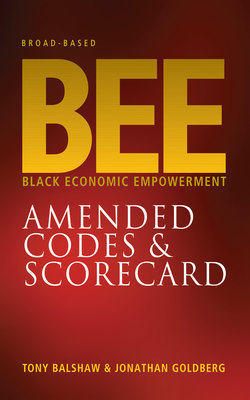Читать книгу Broad-Based BEE - Jonathan Goldberg - Страница 4
На сайте Литреса книга снята с продажи.
Оглавление| INTRODUCTION |
The Amended Codes of Good Practise effective 11 October 2013, are far reaching, and will have a profound impact on businesses in South Africa. The original Codes were operational from 9 February 2007 and there was unprecedented demand for our previous books Cracking Broad-Based Black Economic Empowerment: Codes and Scorecard Unpacked followed by Broad-Based Black Economic Empowerment: Final Codes and Scorecard. We have been overwhelmed and encouraged by the success of these books and the positive feedback received from readers, across the spectrum of businesses, universities and practitioners in South Africa.
Under the aegis of lead author Tony Balshaw we have now updated the book based on the Amended Codes of Good Practice. This book not only takes into account the far reaching changes in the Amended Codes of Good Practice but also addresses the practical application of the Amendments. Where possible the structure and content was retained to provide a user friendly one-stop practical reference source for broad-based BEE practitioners and participants, corporate executives, owners and managers of widely and closely held businesses, directors, government officials, regulators, foreign investors, professionals such as lawyers, accountants and human resource practitioners, students, trade unions, industry bodies and other persons. Transformation efforts and the application of the original Codes of Good Practice has largely driven by the largesse of businesses in South Africa. The Public Sector only started applying the Codes years after they became effective. Whilst the Codes were initially accompanied by unparalleled economic growth, there is concern that these amendments to the Codes will be retrogressive for business, civil society and our economy as a whole and the broad-based BEE momentum lost. The delays by organs of state and public entities in implementing the Codes after they became operational, the capacity and duality of accredited verification agencies, transformation charters and Sector Codes, charter committees promoting changes to key thresholds and targets in the Codes, retrogressive move to narrow-based ownership and onerous scorecard compliance targets and indicators are examples of are challenges that could stall the viability of government’s initiative to promote economic transformation in order to enable meaningful participation in the economy by black people.
There is a retrospective shift in direction toward ownership, which now comprises 57 per cent of the Scorecard points. There is greater emphasis in the Amended Codes on majority black ownership, particularly in relation to the sub-elements of Procurement as well as Enterprise and Supplier Development.
We believe this new book provides much value for the readers; it not only simplifies broad-based BEE - especially in the application of the Amended Codes of Good Practice, but also aids readers in understanding, implementing, calculating, measuring and promoting the objectives of transformation in South Africa.
The book has been broadly structured in three parts to provide a practical and handy reference source for a wide range of readers. We have, wherever possible retained lists of ideas for consideration, easy-to-follow diagrams, practical suggestions, real-life business examples of the concepts in action, useful templates to follow, a glossary of terms and other valuable information flesh out and annotate the text.
First, we introduce the rationale for broad-based BEE, its cascade effect on the economy and the constraints on its implementation. We address the need for changing beliefs and related soft issues, and discuss strategising for change.
Then we examine the legislative framework and introduce the Codes of Good Practice and related terminology. A significant constraint in writing this book has been the apparent oversights and poor drafting of the Amended Codes. Nevertheless, we have pre-empted certain pronouncements and provide the reader with comprehensive information and tools to understand the framework, and to apply and implement all five Elements.
Regular updates and pronouncements can be obtained from the Department of Trade and Industry website or by corresponding with the authors. In the text we generally refer to “businesses”, but use the term “entity” to describe business entities in the context of the BEE legislation and enabling framework.
Finally, we investigate practical considerations for the implementation of broad-based BEE, as well as family business, governance and ownership rewards, acquisitions and valuations, financing, and some specific accounting and taxation considerations.
The impact of broad-based BEE on business has been dramatic. We believe that this book encapsulates and provides a unique perspective on Amended Codes. We trust that our ideas prove to be fundamentally sound in turning change into value for South African businesses of all sizes. We also hope, through this publication, to inform the various stakeholders in our economy, including those charged with “regulating” the Codes, chief among whom are government entities and “big” business.
Tony Balshaw
Jonathan Goldberg
May 2014
